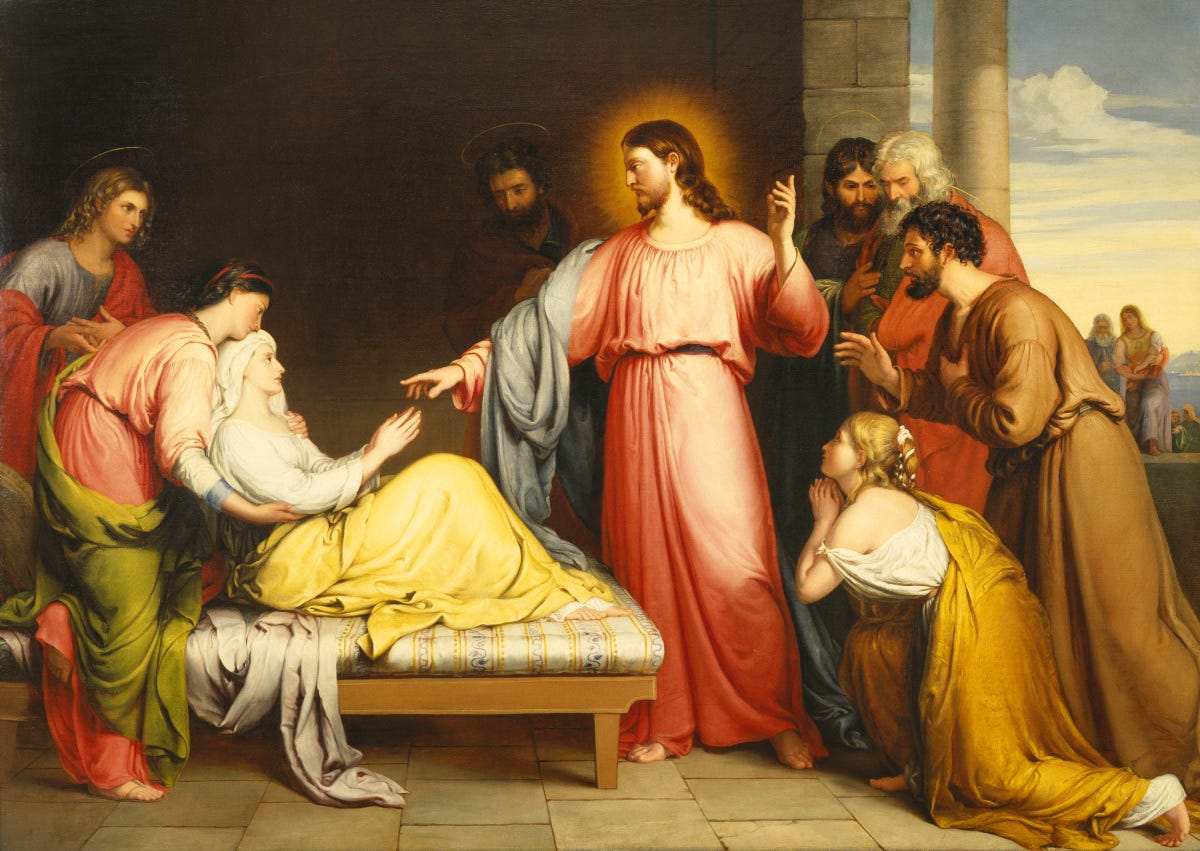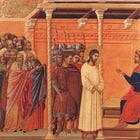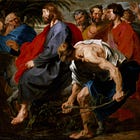Read Along: Lou Reed, Jesus, and the Rest of Us (John 14–21)
Wrapping Up Our Gospel Project: Final Takeaways from Matthew, Mark, Luke, and John
I was walking with a friend a couple of months ago when he mentioned the Velvet Underground’s 1969 song “Jesus.” The first time I heard the song was decades later, sung by a different band. The 77s covered “Jesus” in the early 1980s but didn’t release their version until 1995, as a bonus track on the box-set reissue of their first three albums.
Early 77s sound like post-punk new wave pop echoing The Clash, The Call, R.E.M., and U2—infused with a restless Christian existentialism. To hear these lyrics in that mix of sounds and impulses made perfect sense:
Jesus, help me find my proper place
Jesus, help me find my proper place
Help me in my weakness
’Cause I’m falling out of grace
Jesus
Jesus
But The 77s were half smiling when they recorded and later released the track. Teens and twentysomethings in the 1990s wouldn’t have known the original unless their parents had the vinyl collecting dust in a closet; the Velvet Underground didn’t get much airplay in those dark days before Napster, streaming, and YouTube.
Of course, Velvet Underground frontman Lou Reed did get plenty of radio time in the ’90s. Classic rock stations routinely played Reed’s 1972 solo number, “Walk on the Wild Side.” So The 77s released their cover of “Jesus” at a time when the original singer was probably best known for a louche little ditty about the transgender and queer, drugs, and oral sex. And yet there was Lou Reed nonetheless, singing, “Jesus . . . help me in my weakness/’cause I’m falling out of grace.”
For those who know, how very much like Lou Reed, and also: how very much like Jesus.
I’ve read the gospels most of my life, more or less since I started reading. I don’t think I’ve ever read them straight through, however, until last month. After another friend mentioned she was going to read the gospels in September, I decided to join her. The idea was simple enough; at roughly three chapters a day, a person could finish Matthew, Mark, Luke, and John in one month’s time. Count me in. Many of you joined in the lark—and thank you for the company.
I shared some of my reflections along the way (here, here, here, here), but for this final post on the project I thought back to Lou Reed and the Velvet Underground.
Note of Compassion
“Jesus” is not really a pop song; it’s more of a hymn, more of a prayer. And while it makes perfect sense for a band like the 77s to sing it, the same is just as true for Reed. Jesus is not the property of the faithful; as presented in the gospels, he’s the refuge of all.
Jesus embodied compassion and was alert to those in need. Several examples stood out to me as I read, including the elderly disfigured woman healed in the synagogue. While Jesus taught, as Luke tells it, he saw the woman “bent double and quite unable to stand up straight.” She’d been afflicted for eighteen years, but when Jesus noticed her plight he said simply, “You are rid of your trouble,” and laid hands on her.
“At once she straightened up,” says the evangelist. The leader of the synagogue became indignant. Why? Jesus had healed the woman on the Sabbath, supposedly a no-no. But Jesus fired back:
What hypocrites you are! . . . Is there a single one of you who does not loose his ox or his donkey from the manger and take it out to water on the Sabbath? And here is this woman, a daughter of Abraham, who has been kept prisoner by Satan for eighteen long years: was it wrong for her to be freed from her bonds on the Sabbath?
Jesus’s opponents were left perplexed, says Luke, “while the mass of the people were delighted at all the wonderful things he was doing” (13.10–17).
The Pharisees and temple bureaucrats comprised Jesus’s primary opponents. They not only objected to his methods but, tellingly, the targets of his kindness as well. When Jesus invited Matthew the tax collector—read agent of the Jews’ Roman oppressors—to follow him, Matthew returned the favor by inviting Jesus to dine with him. The Pharisees were incensed, perhaps understandably. “Why is it that your master eats with tax-gatherers and sinners?” they reportedly asked Jesus’s disciples. But Jesus interjected, “It is not the healthy that need a doctor, but the sick. Go and learn what that text means, ‘I require mercy, not sacrifice.’ I did not come to invite virtuous people, but sinners” (Matt. 9.9–13).
The Pharisees drew Jesus’s ire not only for their hypocrisy but also for the cost their hypocrisy imposed on those who could least bear it. He railed at those who “load men with intolerable burdens, and will not put a single finger to the load” (Luke 11.46). In contrast, he promised rest and respite. “Come to me, all whose work is hard, whose load is heavy; and I will give you relief,” he said (Matt. 11.28).
We can multiply these examples: Jesus restored vision to the blind, uncrippled the lame, healed the leprous, freed demoniacs, and forgave sins. What’s more, he never spurned the desperate or marginalized. Whereas the Pharisees imposed burdens and shame, Jesus repeatedly relieved, restored, and dignified.
Great Sin, Greater Mercy
One of the most moving instances of Jesus’s kindness comes from the final chapters of John that closed out our September reading. At the last supper, Jesus famously announced his disciple Peter would deny him. After Jesus had been arrested, Peter trailed behind to the place he was interrogated. “The servants and the police had made a charcoal fire because it was cold, and were standing round it warming themselves,” as John describes the scene. “Peter too was standing with them, sharing the warmth.” And it was then and there at that fire that Peter, when confronted and questioned, denied knowing Jesus three times (see 18.12–27).
But that was not the end of the relationship between Peter and Jesus. Three chapters later the risen Christ met his disciples by the Sea of Tiberias. As the men fished in their boats, Jesus awaited them on the beach. “When they came ashore,” says John, “they saw a charcoal fire there, with fish laid on it, and some bread” (21.9). As they sat to eat, Jesus welcomed Peter back into the fold, asking him three times if he loved him—just as Peter had previously denied him three times. But the number isn’t the only echo.
John uses the term “charcoal fire” (ἀνθρακία, anthrakía) twice—the word’s only two appearances in the entire New Testament—once at the scene of Peter’s betrayal and the second at the scene of his restoration. The evangelist is doubling down on his point: these two scenes are mirrors; one moment recalls the other, great sin and great mercy. The gospels present Jesus as one who sees those in need and reaches out to help, again and again, regardless of their worthiness.
I have no idea if Lou Reed personally understood that notion beyond giving voice to a character in a song. Possibly not.
Reed goes some way to addressing the question of whether he is truly seeking redemption for himself in his 1971 interview with the Metropolitan Review, in which he notes that his songs are “supposed to be little plays. I would see myself as the lead part because I’m a ham, so I would give myself the lead singer role and I would write myself out this dialogue, then I would play different characters. You notice they all have characters which are completely different. And so people used to say ‘that must be you’ or ‘THAT must be you,’ but they couldn’t figure out how I could be the same person because the people in the songs were different, sometimes they would be opposite. For instance you’d have ‘Heroin’ and then you’d have the opposite with ‘Jesus’” (Richie Unterberger, White Light/White Heat: The Velvet Underground Day-by-Day).
But possibly so. I have no trouble believing these completely different characters in Reed’s songbook could be the very same person. Consider Peter: Who else but a great sinner requires great mercy? That’s all of us.
Help me in my weakness
’Cause I’m falling out of grace

Wrapping Up
How do you possibly review the gospels? They are literary artifacts and thus yield to the same treatment to which any other book or work might yield. And yet they are decidedly more. Still, even along the single dimension of literature they evade easy dissection and summation. How many books have been written on the gospels? Innumerable.
Wrapping up this project, I’m left with the desire to jump back in and reread the gospels front-to-back in the same way—and I’ve begun doing exactly that. I’m also left with dozens of impressions and observations about what I just read. Just one: Jesus can be amusingly snarky; some translations possibly bring that out better than others, but it’s hard to miss the minute you start noticing it.
What about you? What stood out for you as you read the gospels this last month?
Thanks for reading! If you enjoyed this post, please hit the ❤️ icon, share it with a friend, and 💬 discuss it in the comments below.
More remarkable reading is on its way. Don’t miss out. Subscribe for free today.
Other posts in this series:








I noticed kindness. I grew up under the influence of modern day pharisees in a fundamentalist environment. The homeschooling program my family was enrolled in used the Sermon on the Mount to teach submission to ultra-conservatism - words that should teach freedom were twisted into shackles. As an adult, I retained my faith while walking away from that fundamentalism and conservatism, but the Gospels are still sometimes hard to read without the old filter.
Reading the Gospels at high speed helped to bypass the tortuous parsing of every phrase that was ingrained from my youth and see the wider arch of mercy and grace. As Jesus said, "The Spirit of the Lord is on me, because he has anointed me to preach the good news to the poor. He has sent me to proclaim release to the captives and recovery of sight to the blind, to set free the oppressed, to proclaim the year of the Lord's favour." (Luke 4:18-19).
Thanx Joel.
Jesus, help me find my place....😌❤️🩹🎶
Lord, have mercy and
....READ YOUR BIBLE! 📖